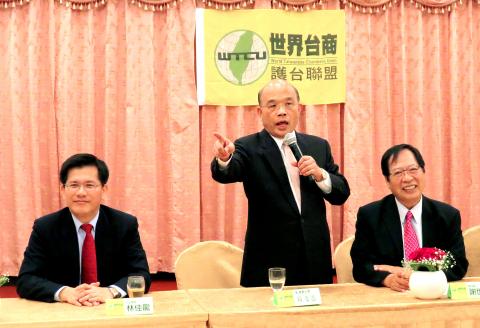The Democratic Progressive Party (DPP) yesterday called for President Ma Ying-jeou (馬英九) to apologize and step down over his low approval rating and what they said was his infringement of the Constitution amid the ongoing wiretapping controversy involving Legislative Speaker Wang Jin-pyng (王金平).
“We think that Ma is no longer fit to serve as president,” DPP Chairman Su Tseng-chang (蘇貞昌) said at a luncheon with Taiwanese businesspeople yesterday.
In 2007, Ma called on then-president Chen Shui-bian (陳水扁) to step down becuase his approval rating at the time had fallen to 18 percent, Su said, adding that Ma, who has an approval rating of 9.2 percent, should “practice what he preached.”

Photo: Chang Ching-ya, Taipei Times
The Ma administration has violated the principle of the separation of powers by allowing the Supreme Prosectors’ Office Special Investigation Division (SID) to abuse of its authority and wiretap members of the Legislative Yuan, Su said.
Most importantly, Ma, who pledged there would be no illegal or political wiretapping under his administration, broke his promise and should learn from former US president Richard Nixon, who offered his resignation following the Watergate scandal in 1972, by resigning, Su said.
Former DPP chairperson Tsai Ing-wen (蔡英文) echoed Su’s call, saying in a press release that Ma “should give serious thought to whether he is still suitable for the job.”
The judicial system’s abuse of power in the case has been obvious and Ma could also be involved in the scandal, which is why the fairness and independence of the Ministry of Justice’s special investigation panel is questionable, she said.
Tsai urged the suspension of judicial officials related to the case, including Prosecutor-General Huang Shih-ming (黃世銘), pending further investigation and called for a special committee to be established under the Legislative Yuan.
“President Ma should face his responsibility, and the people, with honesty because he was the one who sparked the political strife and the row is worse than the Watergate scandal, in terms of the abuse of power and the ensuing constitutional crisis,” Tsai said.
The DPP caucus told a press conference yesterday morning that the ministry’s special investigation panel would not be fair because Justice Minister Lo Ying-shay (羅瑩雪) already said that the SID’s wiretaps on the legislature were “unintentional.”
The DPP is going to call an international press conference today to address the wiretapping scandal and a party meeting to weigh in on its next appropriate step among the four available options of recall, impeachment, motion of no confidence and interpretation of the Constitution against the Ma administration, DPP caucus director-general Gao Jyh-peng (高志鵬) said.

US President Donald Trump yesterday announced sweeping "reciprocal tariffs" on US trading partners, including a 32 percent tax on goods from Taiwan that is set to take effect on Wednesday. At a Rose Garden event, Trump declared a 10 percent baseline tax on imports from all countries, with the White House saying it would take effect on Saturday. Countries with larger trade surpluses with the US would face higher duties beginning on Wednesday, including Taiwan (32 percent), China (34 percent), Japan (24 percent), South Korea (25 percent), Vietnam (46 percent) and Thailand (36 percent). Canada and Mexico, the two largest US trading

China's military today said it began joint army, navy and rocket force exercises around Taiwan to "serve as a stern warning and powerful deterrent against Taiwanese independence," calling President William Lai (賴清德) a "parasite." The exercises come after Lai called Beijing a "foreign hostile force" last month. More than 10 Chinese military ships approached close to Taiwan's 24 nautical mile (44.4km) contiguous zone this morning and Taiwan sent its own warships to respond, two senior Taiwanese officials said. Taiwan has not yet detected any live fire by the Chinese military so far, one of the officials said. The drills took place after US Secretary

CHIP EXCEPTION: An official said that an exception for Taiwanese semiconductors would have a limited effect, as most are packaged in third nations before being sold The Executive Yuan yesterday decried US President Donald Trump’s 32 percent tariff on Taiwanese goods announced hours earlier as “unfair,” saying it would lodge a representation with Washington. The Cabinet in a statement described the pledged US tariffs, expected to take effect on Wednesday next week, as “deeply unreasonable” and “highly regrettable.” Cabinet spokeswoman Michelle Lee (李慧芝) said that the government would “lodge a solemn representation” with the US Trade Representative and continue negotiating with Washington to “ensure the interests of our nation and industries.” Trump at a news conference in Washington on Wednesday announced a 10 percent baseline tariff on most goods

THUGGISH BEHAVIOR: Encouraging people to report independence supporters is another intimidation tactic that threatens cross-strait peace, the state department said China setting up an online system for reporting “Taiwanese independence” advocates is an “irresponsible and reprehensible” act, a US government spokesperson said on Friday. “China’s call for private individuals to report on alleged ‘persecution or suppression’ by supposed ‘Taiwan independence henchmen and accomplices’ is irresponsible and reprehensible,” an unnamed US Department of State spokesperson told the Central News Agency in an e-mail. The move is part of Beijing’s “intimidation campaign” against Taiwan and its supporters, and is “threatening free speech around the world, destabilizing the Indo-Pacific region, and deliberately eroding the cross-strait status quo,” the spokesperson said. The Chinese Communist Party’s “threats